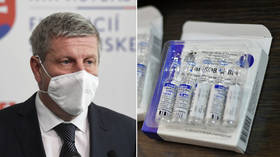Hungarian laboratory confirms Russia’s Covid-19 vaccine reliable, says Slovak health minister after row over Sputnik V

Initial results of a formal review of Russia’s Sputnik V vaccine for Slovakia carried out by a Hungarian lab show the vaccine is reliable, said Slovakia’s health minister.
Speaking in a TV interview on Friday, Vladimir Lengvarsky said the first results of the tests in Hungary had become available and they were “positive”, adding they were awaiting the results of the Russian side. The minister didn’t elaborate on whether the Russian vaccine would be approved for use once the final results are in.
Also on rt.com As Hungary trials all major Covid-19 vaccines, Budapest says Russia’s Sputnik V doing well in initial safety & efficacy analysisThe row over Russia’s Sputnik V vaccine erupted in March when then-Prime Minister Igor Matovic ordered two million doses of the vaccine despite the lack of approval by the European Medicines Agency (EMA). Matovic, who cited shortages of the EMA-approved Pfizer, Moderna and AstraZeneca jabs in the country as the reason for his decision, was forced to resign as his coalition partners protested the arrival of the first doses of the Russian jab.
In April, Slovak drugs regulator SUKL published a negative assessment of Sputnik V saying that the doses delivered to Slovakia were different to those submitted to the EMA for review. SUKL also claimed the batch did not have the same characteristics as described in reputable medical journal The Lancet and accused Russia of failing to provide sufficient data on the jab.
In turn, Russia asked the Slovak government to return the 200,000 doses of the vaccine citing numerous contract violations so that the doses could be used in other countries.
Also on rt.com ‘Simple and reliable as Kalashnikov assault rifle’: Putin speaks about Russia’s Covid-19 vaccinesSlovakia then asked neighboring Hungary to help assess the Russian vaccine for use in the country. Hungary’s Foreign Minister Peter Szijjarto agreed to the request, citing Hungary’s “capacity, internationally accredited laboratories and knowledge.” A sample of 600 doses were also sent back to Moscow for testing.
Like this story? Share it with a friend!












